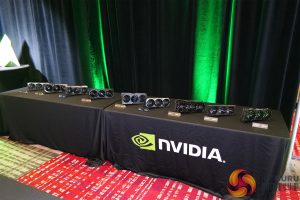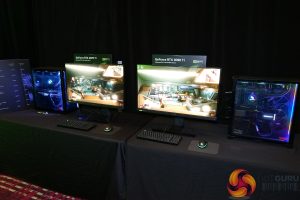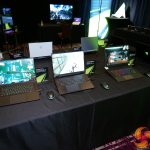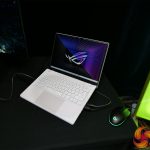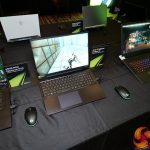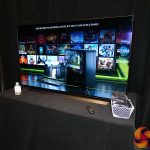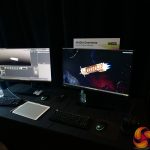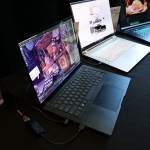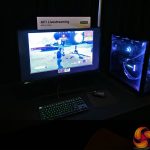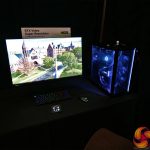Leo and Luke have made their way over to Las Vegas for CES 2023, and the chaps stopped by Nvidia's suite to see what is going on. We already know about the new RTX 4070 Ti as reviews went live yesterday, but we also got a look at some brand-new RTX 40-series laptops, RTX Remix, as well as the benefits of AV1 encoding for livestreaming.
Watch via YouTube below:
Timestamps
00:00 RTX 4070 Ti and 3090 Ti – DLSS 2 v 3
01:50 A line of 4070 Tis!
01:41 A pretty white ‘Colorful’ card
02:05 40 series graphics in laptops
03:05 ASUS ROG Zephyrus G14 4090
04:06 Nvidia GeForce RTX Studio
04:41 Some other laptops
05:22 Nvidia RTX Remix built on Omniverse
05:55 AV1 Livestreaming
07:25 Close out
First of all, Leo got a good look at various RTX 4070 Ti graphics card. This is hardly surprising considering it is Nvidia's latest graphics card release, and you can find our full review live over HERE. Nvidia was pitting the RTX 4070 Ti head to head with the RTX 3090 Ti, while also highlighting the benefits that DLSS 3 can offer for the 40-series cards versus the previous generation.
Of course, the company also announced new RTX 40-series laptop GPUs during the CES keynote, powered by the Ada Lovelace architecture. There was a table full of them at Nvidia's suite, with the company highlighting the added performance efficiency of the new architecture versus previous generations.
14″ machines appear to be an every growing form-factor for laptops too, with plenty of RTX 4070-based laptops in the 14″ class. We even got a look at the ASUS ROG Zephyrus G14 running a 90W RTX 4090. Plus if you want a desktop replacement, we got a look at a single RTX 4090-equipped Razer Blade running triple 4K monitors.
RTX laptop GPUs also find a home as part of Nvidia's Studio lineup, where we got a look at the new ASUS ZenBook Pro 14 OLED running productivity applications. This laptop backs in a new RTX 4070, when previously the chassis design was limited to something like an RTX 3050 – Nvidia is clearly highlighting the new power efficiency of the new chips for work and not just gaming!
That's also true of the new AV1-capable dual-NVENC encoders. Not only can these offer a real-time increase in encode speed, as shown when looking at the new Razer Blade 18, but AV1 offers clear benefits for livestreaming due to its greater efficiency. Leo got a look at this in action, with a 4K stream on go, with Nvidia suggesting an 8Mbps AV1 stream is roughly equivalent to the quality of a 25Mbps H.264 encode. AV1 does require support from apps like Twitch and so on, so it's not yet universally supported, but the quality looks very promising indeed.
Discuss on our Facebook page HERE.
KitGuru says: If you want to see Leo start a livestreaming channel, let us know down below…
 KitGuru KitGuru.net – Tech News | Hardware News | Hardware Reviews | IOS | Mobile | Gaming | Graphics Cards
KitGuru KitGuru.net – Tech News | Hardware News | Hardware Reviews | IOS | Mobile | Gaming | Graphics Cards


